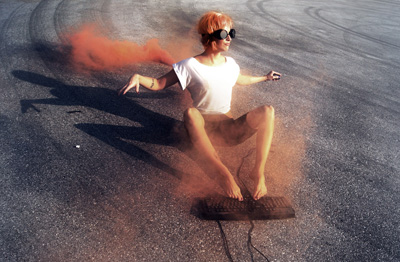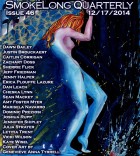Wow, can I relate to your story! I grew up in a devout Roman Catholic family. I, like Brother Bill, left the “narrow” path after I went away to life and college. So your story really struck a chord with me. It was a gut punch, really. Is this part of your experience?
“Brother Bill” was one of my first forays into flash fiction and, given the limitations that the genre imposes on narrative and character, “gut punch” was, more or less, the intended effect. It’s rewarding to hear that you enjoyed the story.
As far as the story’s relationship with my personal (which is to say, actual) experience, “Brother Bill” probably qualifies as one of my least autobiographical stories. I say that because I wrote it with a friend in mind. Like Bill, this friend had an intensely religious and highly oppressive childhood and came to associate religion (and therefore God) with rules and the guilt that ensues when those rules are broken. And, like Bill, he went to college and found escape in booze and women. It hurt me deeply to see him wrestle with those conflicting desires—obedience to his past and a certain freedom in his present.
Do you find that you want to “throw . . . rocks at the sky” because religion had “scar[ed] holiness into your bones and stuff[ed] your dreams with sulfur”? I know I wanted to curse the heavens, my beliefs. On the other hand, my anger is balanced with gratitude for those who gave me a childhood and beliefs that they thought were for my own good. Does your past haunt your writing with all kinds of conflictions just like religion haunts Brother Bill?
I love what you said about balancing anger and gratitude, about looking back on the people from your childhood who took the time (not to mention the energy) to teach and model their beliefs because, as far as they could tell, those beliefs were the “best thing” for you. There’s an implicit humility in this way of thinking that is very appealing to me. I recently became a father and I can only hope that my two daughters have more grace for me than I had for my parents.
The forcefulness of those two verbs—”scared” and “stuffed”—is meant to capture an especially intense form of parenting. My childhood was radically different from Bill’s. My parents were sweet, laid-back people who taught us to think for ourselves and allowed us to make mistakes. There was never a sense of oppression or anger in my house. What you said about anger, though, is very true. Whether it’s religion or politics or something entirely inconsequential, it’s inevitable for young people to rebel against their parents’ way of thinking. I certainly did. I’ve thought about this a great deal and, to this day, have no idea how or why it happens.
Because, yes, I’ve thrown my fair share of rocks at the sky. When I was young, those rocks were aimed at parents, teachers, and even friends. The older I get, though, the more I take aim at myself. I regret people I’ve hurt, opportunities I’ve squandered, and time I’ve wasted. If anything haunts me, it’s my capacity to make poor decisions.
What do you think of other writers who grapple with spirituality and religious themes? Is spirituality a theme in some or in all of your writing?
I think all writing is spiritual writing. I’m not trying to be clever in saying that. I only mean to suggest that the spirit (which I consider interchangeable with the heart or the soul) exists in all of us. I think that Christianity advances a particularly clear position on why we have a spirit and what that spirit is designed for. So, in that sense, writers like Flannery O’Connor, Dostoevsky, Breece Pancake, and even John Updike are more easily classified as spiritual or religious writers, since a reader could parse their fiction for a belief associated with the Christian faith.
And yet, most of my favorite writers are not men and women whom you would call spiritual writers. Still I read their work and discover everything you just mentioned—a grappling with metaphysical questions, a story bound up in certain beliefs, and certainly a consistent (if not explicit) depiction of human nature. Raymond Carver, Tim O’Brien, Alice Munro—I find these writers to be incredibly spiritual. The Sportswriter by Richard Ford might be the most spiritual piece of fiction I’ve ever read. Reading it, for me, is almost revelatory.
As for my own writing, I can only say that my personal faith sneaks in through the same door as geography, characterization, and all the other stuff—which is to say, through that inexplicable door; that miraculous door; the door that somehow carries all a writer’s past assumptions and experiences onto the page. I’m almost scared to mention it for fear that it will slam shut forever. Isn’t it a miracle that it swings open every time we sit down to write? Usually, I start with an image and go from there. Sometimes, a sentence just comes to me and I do my best to unpack it. With “Brother Bill,” everything blossomed out of that image of a young man throwing rocks at the sky. That was the story’s origin. From there, I simply asked questions that drove the narrative forward. From that image, the story practically wrote itself.
I really love that last paragraph when your second-person narrator states, “[S]ome mornings you hear those voices. They remind you. They insist. [. . .] That’s when you watch the sunlight and wonder if they will ever stop, or even should.” Your language and use of time in your story is so wonderful. You chose white space instead of transitions. Why? Did you intend for this to read almost like a litany prayer (rhythmically speaking)?
I can’t imagine a book to which I am more deeply indebted, as a writer and as a human, than the Bible. It not only developed my literary ear—in terms of phrasing and cadence—but also my literary heart—in terms of purpose and conviction.
I’m glad you mentioned that last paragraph. A couple paragraphs earlier, there’s a sentence tucked away that serves as a kind of setup for understanding the conclusion. It comes after Bill has left for college and, in a certain sense, abandoned most of his previous convictions and, yet, he still keeps a Bible in his bathroom. The line goes, “You still read it every once in a while. In reading it, He became distinguishable from them. [. . .] You read it for yourself, though, and made sense of it without the help of their voices.”
Brief as they are, these lines mark a transition for Bill. The voices that plague him early in the story are the same detestable voices that “hate liberals and queers.” But the voices in the last paragraph are not human voices of guilt and condemnation, but rather a divine voice of love and concern, echoing, ultimately, from his knowledge of God in the Bible. Although, on the surface, “Brother Bill” has a tragic feel to it, to me, it’s a snapshot of a guy who wasn’t dealt the best hand in terms of the whole religion thing, but a guy who, if he’s willing to keep seeking, to keep throwing rocks, will find his way back again.



 The core workshop of SmokeLong Fitness is all in writing, so you can take part from anywhere at anytime. We are excited about creating a supportive, consistent and structured environment for flash writers to work on their craft in a community. We are thrilled and proud to say that our workshop participants have won, placed, or been listed in every major flash competition. Community works.
The core workshop of SmokeLong Fitness is all in writing, so you can take part from anywhere at anytime. We are excited about creating a supportive, consistent and structured environment for flash writers to work on their craft in a community. We are thrilled and proud to say that our workshop participants have won, placed, or been listed in every major flash competition. Community works.